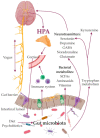Bacterial Metabolites of Human Gut Microbiota Correlating with Depression - PubMed (original) (raw)
Review
Bacterial Metabolites of Human Gut Microbiota Correlating with Depression
Olga V Averina et al. Int J Mol Sci. 2020.
Abstract
Depression is a global threat to mental health that affects around 264 million people worldwide. Despite the considerable evolution in our understanding of the pathophysiology of depression, no reliable biomarkers that have contributed to objective diagnoses and clinical therapy currently exist. The discovery of the microbiota-gut-brain axis induced scientists to study the role of gut microbiota (GM) in the pathogenesis of depression. Over the last decade, many of studies were conducted in this field. The productions of metabolites and compounds with neuroactive and immunomodulatory properties among mechanisms such as the mediating effects of the GM on the brain, have been identified. This comprehensive review was focused on low molecular weight compounds implicated in depression as potential products of the GM. The other possible mechanisms of GM involvement in depression were presented, as well as changes in the composition of the microbiota of patients with depression. In conclusion, the therapeutic potential of functional foods and psychobiotics in relieving depression were considered. The described biomarkers associated with GM could potentially enhance the diagnostic criteria for depressive disorders in clinical practice and represent a potential future diagnostic tool based on metagenomic technologies for assessing the development of depressive disorders.
Keywords: aminoacids; biomarkers; depression; functional foods; gut microbiota; gut-brain axis; neurotransmitters; psychobiotics.
Conflict of interest statement
The authors declare no conflict of interest.
Figures
Figure 1
Schematic image of the role of the gut microbiome in the gut-brain axis.
Similar articles
- Human Gut Microbiota for Diagnosis and Treatment of Depression.
Averina OV, Poluektova EU, Zorkina YA, Kovtun AS, Danilenko VN. Averina OV, et al. Int J Mol Sci. 2024 May 26;25(11):5782. doi: 10.3390/ijms25115782. Int J Mol Sci. 2024. PMID: 38891970 Free PMC article. Review. - Brain-gut-microbiota axis in depression: A historical overview and future directions.
Chang L, Wei Y, Hashimoto K. Chang L, et al. Brain Res Bull. 2022 May;182:44-56. doi: 10.1016/j.brainresbull.2022.02.004. Epub 2022 Feb 11. Brain Res Bull. 2022. PMID: 35151796 Review. - Emerging role of Gut-microbiota-brain axis in depression and therapeutic implication.
Evrensel A, Tarhan KN. Evrensel A, et al. Prog Neuropsychopharmacol Biol Psychiatry. 2021 Mar 2;106:110138. doi: 10.1016/j.pnpbp.2020.110138. Epub 2020 Oct 16. Prog Neuropsychopharmacol Biol Psychiatry. 2021. PMID: 33075447 Review. - Probiotics and Psychobiotics: the Role of Microbial Neurochemicals.
Oleskin AV, Shenderov BA. Oleskin AV, et al. Probiotics Antimicrob Proteins. 2019 Dec;11(4):1071-1085. doi: 10.1007/s12602-019-09583-0. Probiotics Antimicrob Proteins. 2019. PMID: 31493127 Review. - Gut Biofactory-Neurocompetent Metabolites within the Gastrointestinal Tract. A Scoping Review.
Skonieczna-Żydecka K, Jakubczyk K, Maciejewska-Markiewicz D, Janda K, Kaźmierczak-Siedlecka K, Kaczmarczyk M, Łoniewski I, Marlicz W. Skonieczna-Żydecka K, et al. Nutrients. 2020 Nov 1;12(11):3369. doi: 10.3390/nu12113369. Nutrients. 2020. PMID: 33139656 Free PMC article. Review.
Cited by
- Self-Initiated Dietary Adjustments Alter Microbiota Abundances: Implications for Perceived Health.
Willems A, Sura-de Jong M, Klaassens E, van den Bogert B, van Beek A, van Dijk G. Willems A, et al. Nutrients. 2024 Oct 18;16(20):3544. doi: 10.3390/nu16203544. Nutrients. 2024. PMID: 39458538 Free PMC article. - Cutting-Edge iPSC-Based Approaches in Studying Host-Microbe Interactions in Neuropsychiatric Disorders.
Mihailovich M, Soković Bajić S, Dinić M, Đokić J, Živković M, Radojević D, Golić N. Mihailovich M, et al. Int J Mol Sci. 2024 Sep 21;25(18):10156. doi: 10.3390/ijms251810156. Int J Mol Sci. 2024. PMID: 39337640 Free PMC article. Review. - Probiotic Functions in Fermented Foods: Anti-Viral, Immunomodulatory, and Anti-Cancer Benefits.
Pyo Y, Kwon KH, Jung YJ. Pyo Y, et al. Foods. 2024 Jul 28;13(15):2386. doi: 10.3390/foods13152386. Foods. 2024. PMID: 39123577 Free PMC article. Review. - Microbiome and Metabolite Analysis Insight into the Potential of Shrimp Head Hydrolysate to Alleviate Depression-like Behaviour in Growth-Period Mice Exposed to Chronic Stress.
Hu L, Ye W, Deng Q, Wang C, Luo J, Huang L, Fang Z, Sun L, Gooneratne R. Hu L, et al. Nutrients. 2024 Jun 19;16(12):1953. doi: 10.3390/nu16121953. Nutrients. 2024. PMID: 38931307 Free PMC article. - The use of omics technologies in creating LBP and postbiotics based on the Limosilactobacillus fermentum U-21.
Odorskaya MV, Mavletova DA, Nesterov AA, Tikhonova OV, Soloveva NA, Reznikova DA, Galanova OO, Vatlin AA, Slynko NM, Vasilieva AR, Peltek SE, Danilenko VN. Odorskaya MV, et al. Front Microbiol. 2024 Jun 11;15:1416688. doi: 10.3389/fmicb.2024.1416688. eCollection 2024. Front Microbiol. 2024. PMID: 38919499 Free PMC article.
References
Publication types
MeSH terms
Substances
LinkOut - more resources
Full Text Sources
Medical
